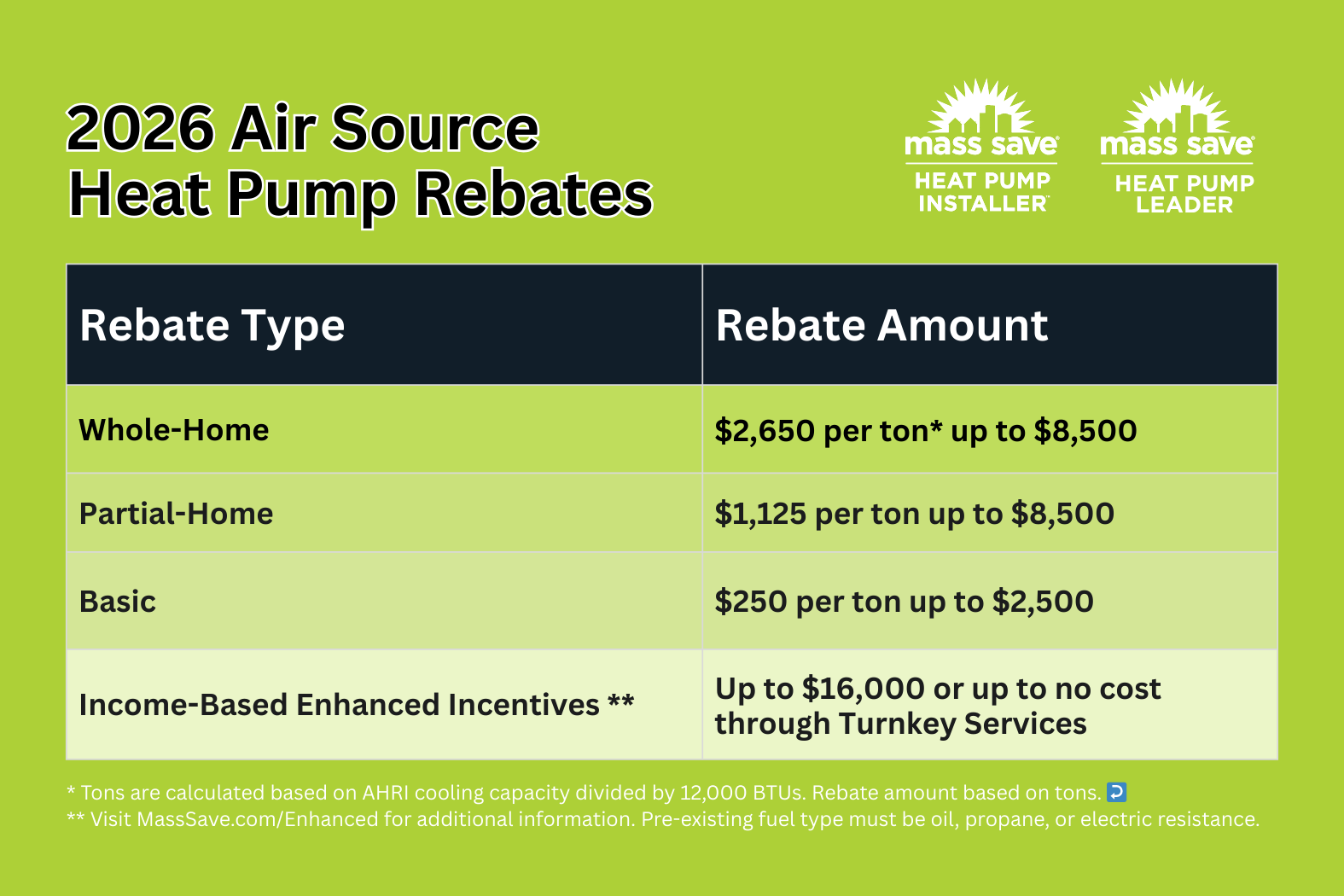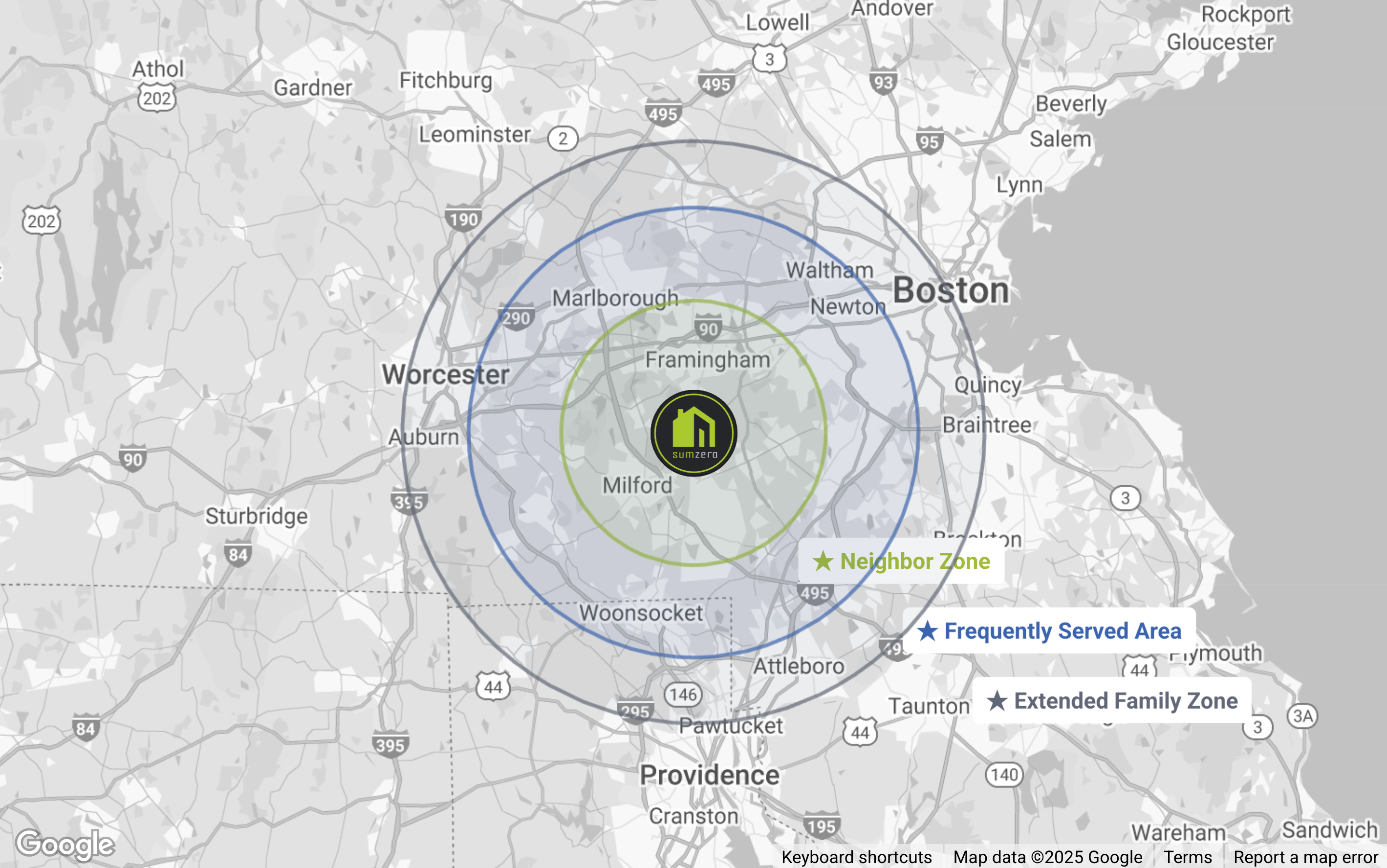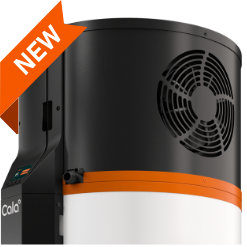2026 Mass Save Heat Pump Rebates and Program Changes | Rebates & Tax Credits | Douglas, MA
2026 Mass Save heat pump rebates offer up to $8,500 in incentives for Douglas homeowners installing eligible high-efficiency systems using low-GWP refrigerants. While rebates are still available, stricter rules and a $1,500 drop from 2025 mean acting quickly is key to maximizing your savings.

2026 Mass Save Heat Pump Rebates and Program Changes
Living in Douglas, MA, homeowners experience a mix of New England’s fiercest winters and humid summers, making efficient, year-round home comfort a top priority. Now more than ever, the shift to clean, energy-efficient systems like air source heat pumps isn’t just smart—it’s financially backed. The 2026 updates to the Mass Save® heat pump rebate program bring some of the largest changes we've seen in years.
At SumZero Energy Systems, we help homeowners in Douglas and the broader Worcester County make the most of these evolving incentives. With rebate amounts decreasing and technical qualification rules tightening, understanding the landscape in 2026 is essential if you're considering upgrading your heating and cooling system.
“Mass Save® rebates are getting smaller, not bigger—and residents in Douglas need to act swiftly to secure top-tier incentives before they decline further.”
Below you’ll find everything you need to know about updated rebate amounts, eligibility rules, key changes from 2025, and how to make an informed decision for your home in Douglas, MA.
Understanding the 2026 Mass Save® Heat Pump Rebates
The Mass Save® program has reduced overall rebate amounts for 2026 while increasing the stringency of eligibility requirements. While generous incentives are still available, the time to act is now, especially for homeowners aiming to claim the highest possible rebates.
2026 Rebate Amounts Breakdown
Mass Save® rebates are structured around different installation types. These determine both the per-ton rebate value and your total rebate eligibility.
- Whole-Home Rebate: $2,650 per ton, up to a maximum of $8,500
- Partial-Home Rebate: $1,125 per ton, up to $8,500
- Basic Rebate: $250 per ton, capped at $2,500
- Income-Based Enhanced Incentives: Up to $16,000, or up to no-cost installation through approved Turnkey Services partners
This represents a $1,500 decrease from 2025’s top-level rebate of $10,000—meaning those waiting too long could miss out on bigger savings.
“The 2026 rebate structure rewards homeowners who commit to full electrification sooner, especially those replacing ALL fossil fuel systems with heat pumps.”
What Changed from the 2025 Program?
In addition to reduced rebate ceilings, the qualifications to receive these incentives have grown more stringent:
- Federal tax credits are no longer available for air-source heat pumps.
- Only systems using approved low-GWP refrigerants now qualify—older R-410A refrigerant-based models do not.
- Incentives are dropping year-over-year, not increasing with inflation.
Considering long-range savings and strict energy efficiency standards in Massachusetts, these changes reflect a shift toward sustainable but regulated incentives.
Key Eligibility Requirements for 2026 Rebates
Understanding eligibility is crucial before planning your upgrade.
Low-GWP Refrigerants Now Mandatory
In 2026, all rebate-eligible heat pumps must use refrigerants with low global warming potential (low-GWP). For most systems installed before 2026, R-410A was the standard, which now disqualifies them under new Mass Save standards.
This change aligns with the Massachusetts climate roadmap’s goal of significantly reducing greenhouse gas emissions by 2050.
Whole and Partial-Home Qualification Guidelines
To qualify for Whole-Home Heat Pump Rebates, your system must:
- Replace all existing fossil fuel systems or electric resistance heating
- Serve the entirety of your home’s heating and cooling loads
- Be installed in a home that passes a home energy assessment, often with weatherization upgrades
Partial-home systems still offer good savings for specific zone upgrades, but they deliver less per ton than whole-home options.
For more details and official rebate documents from Mass Save, you can visit the official Air Source Heat Pump rebate page.
Why Heat Pumps Are Still a Smart Choice in Douglas, MA
Despite changes in the rebate program, heat pumps remain the most state-supported electrification investment for homeowners. In the Douglas area, where oil and propane are common, the shift can cut energy costs significantly.
Energy Efficiency in Four Seasons
Douglas sees chilly winters pushing lows into the single digits and increasingly hot summer days throughout July and August. Heat pumps offer reliable efficiency in both extremes, especially when sized and installed correctly for Massachusetts climate zones.
Modern cold-climate heat pumps—especially ducted systems—are engineered to maintain heating output even in sub-zero temperatures, which are not uncommon in Worcester County.
“From icy late January nights to muggy July afternoons, a properly installed heat pump in Douglas can handle it all—without fossil fuels.”
Combining Comfort and Cost Savings
With reduced operating costs compared to oil and electric baseboard heating, heat pumps offer more than just environmental benefits—there are real, tangible financial savings year over year, particularly when combined with Douglas’s competitive utility rates and available seasonal rate plans.
How Timing Affects Rebate Amounts
If you’re considering a heat pump installation in 2026, timing is not just important—it’s decisive.
Rebates Are Shrinking Over Time
Every year since 2023, Mass Save has signaled a gradual step-down in total rebate amounts. By 2026, homeowners are already seeing a 15% decrease in total potential savings compared to just one year prior.
The state’s strategy appears focused on the “early adopters” of heat pump technology, pushing larger rebate incentives without sustaining them permanently.
Acting Now Locks in Benefits
In practice, this means:
- Working with approved heat pump contractors like SumZero Energy Systems to ensure all qualifications and application steps are met
- Scheduling your Mass Save Home Energy Assessment promptly
- Coinciding your install timeline with rebate windows before further reductions
Douglas homeowners who wait until late 2026 or beyond could face both reduced rebates and higher equipment costs, especially as regulations tighten.
Additional Savings: Utility Seasonal Rate Programs
Beyond Mass Save, local Douglas homeowners may gain additional savings through Winter Reduced Rate Programs offered via your utility provider.
What Are Winter Reduced Rate Programs?
These offer incentives to shift or reduce heating electricity usage during peak grid demand, often in exchange for lower per-kWh rates during off-peak hours. Heat pumps are uniquely compatible with such programs because of their flexible, programmable operation and high efficiency.
Eligibility in Douglas
Not all programs are universal across Massachusetts. You must confirm participation through local utility providers such as National Grid or Eversource. SumZero Energy Systems can help guide you through local qualification specifics relevant to Douglas-based homes.
Making the Right Heat Pump Investment
Choosing the best heat pump involves more than just picking a high-SEER model—it’s about matching your system to your home and the current incentives.
Choosing the Right System for Your Home Type
Douglas homeowners live in a diverse mix of housing—from historic farmhouses with older ductwork to newer constructions with flexible layouts:
- For larger or multi-story properties, ducted or multi-zone heat pumps provide the best whole-home functionality.
- For additions, in-law suites, or retrofits, ductless mini-split systems are a popular and affordable choice.
- If your home has ductwork in poor shape or needs weatherization, pairing your heat pump with a blower door test may unlock extra weatherization incentives.
Working With a Qualified Installer
Only systems installed by Mass Save–certified contractors are eligible for rebate payouts. Moreover, these contractors follow strict load-calculation methods that ensure the heat pump operates as intended through New England’s cold snaps and summer spikes.
Here's what to expect when working with a qualified contractor:
- Home energy assessment scheduling
- Proper sizing based on heat load analysis, not square footage alone
- Submission of paperwork for rebate approval and completion
Contractors must also use equipment listed on Mass Save’s Qualified Equipment List, meaning a homeowner can’t DIY and still claim top-level incentives.
Final Words: The 2026 Heat Pump Rebate Landscape in Douglas
For Douglas, MA residents, the window for maximizing Mass Save® rebate benefits is narrowing. Whether you’re tired of high propane bills or looking for an eco-conscious, state-supported upgrade, heat pumps remain one of the most cost-effective improvements you can make.
By staying informed and acting early, Douglas homeowners can lock in incentives as high as $8,500—or up to $16,000 if income-qualified—while preparing their homes for a cleaner, more sustainable energy future.
“With the right planning, Douglas homeowners can still take full advantage of 2026’s rebates before they shrink even further—delivering both short- and long-term savings.”
What Local Homeowners Are Saying
See how SumZero has helped local homeowners stay comfortable year-round with energy-efficient heat pump solutions.
Not Sure Where to Start? We’ll Guide You
Let our experts design the right heating and cooling solution—customized for your comfort, your layout, and your energy goals. No pressure. Just clarity.
Request FREE ESTIMATE












